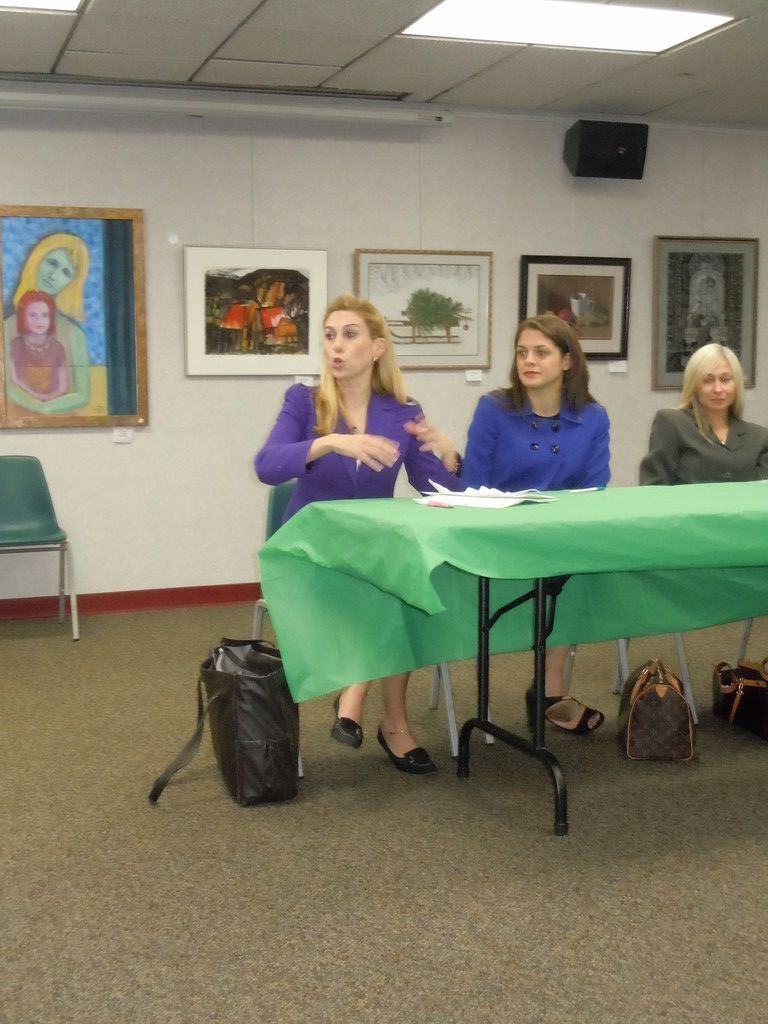Play it safe — and smart in Rockville Centre
Legal experts, police commissioner offer advice for teens at library forum
Teens and parents were invited to attend “The Legal Perspective,” a presentation at the Rockville Centre Public Library on April 14 during which four legal experts and Police Commissioner Charles Gennario explored the consequences of the ill-advised decisions teenagers often make. A panel comprising two judges, a prosecutor and a defense attorney described in detail what can happen as a result.
Over the course of 90 minutes, five juniors from South Side High School — Courtney Hunter, Kasey Ng, Lily Schoen, Leah Buchman and Dana Yberg — reacted to several hypothetical scenarios, and the legal experts offered their opinions. In the first situation, a group of teens were pulled over by a police officer for a traffic violation, and the officer suspected the underage students of having alcohol in the trunk. Defense attorney Kimberly Lerner — a native of Rockville Centre — explained that the group had the right not to consent to a search because the officer did not have a warrant. But if the students had nothing to hide, Lerner added, it was probably in their best interest to allow the officer to search the car.
“Being cooperative and polite is always the way to go,” Nassau County District Court Judge Rhonda Fischer said. “Because police take notes and hand it to [the judge]. So I know whether you were difficult or mouthed off, and it’ll make a difference when you’re arraigned.”
Ellen Greenberg, a Nassau County Family Court judge, agreed with Fischer.
In the second scenario, a student was suspected of marijuana possession and school administrators wanted to search his locker. Lerner said that the school has that right if there is “reasonable suspicion.”
Deputy Nassau County Attorney Julia D’Agostino said that the consequences of drug possession in school can be disastrous: a lengthy suspension and possible home tutoring for an indefinite amount of time. “It’s always best not to have anything in your locker,” said D’Agostino. “Make sure you know what’s in there, and make sure your friends aren’t storing anything illegal in your locker, either.”
In the third scenario, teens were invited to a house party, and alcohol and other drugs were brought into the home under parental supervision. During the course of the evening, a group of teens who were invited to the house and then left were involved in a serious car accident. The question raised by this series of events is, who is responsible?
The panel referenced the Social Host law, which ascribes liability to the adults and teens over 18 who hosted the party. If the parents are home at the time of the accident, they are charged. If not, older teens are.
“In the village, we have our own Social Host law, so that a 16- or 17-year-old can be charged and go to Village Court,” said Gennario. “So if the parents are in Florida and the kids have a party, we can take the kids to court … and we have used it.”
The final scenario focused on the social networking website Facebook, and the panel discussed how teens should avoid posting photos of themselves doing drugs or engaging in illegal behavior.
“Facebook can be the root of all evil,” said D’Agostino, adding that some people have gotten into legal trouble for posting gang pictures on the website.
“Facebook can get adults in trouble, too,” said Fischer. “I cannot tell you how many violations I get from it.”
As the discussion, which was sponsored by the National Council of Jewish Women’s South Shore section, wrapped up, panel members stressed the importance of teens making wise decisions, even during the difficult transition from childhood to adulthood, when experimentation is common. They told the South Side juniors to be careful and to avoid making bad decisions at all costs because not doing so can jeopardize their future.
“I hope you heed their words,” Gennario said to the students.
“It was very informative,” said Schoen. “I learned a lot.”

 47.0°,
Mostly Cloudy
47.0°,
Mostly Cloudy 




